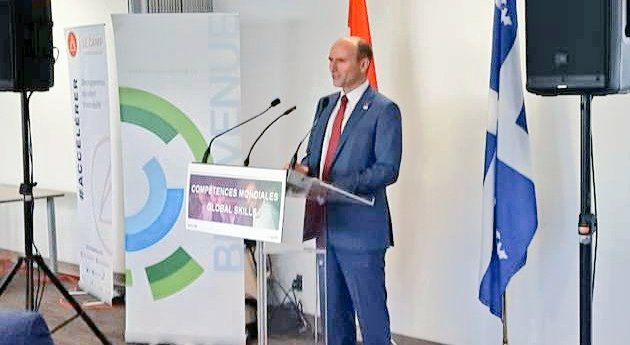Canada News
Housing plan designed to improve housing affordability, Duclos says

FILE: The idea behind the government’s plan — spending billions first to build up Canada’s stock of affordable housing, and later to provide direct benefits to tenants, rather than spending on shelters — is to ensure fewer Canadians remain or become homeless over time, Social Development Minister Jean-Yves Duclos said in an interview. (Photo: Jean-Yves Duclos/Facebook)
OTTAWA — The Liberal government’s vision for tackling homelessness and easing the crunch in affordable housing deliberately focuses spending on building and finding homes for low-income Canadians, rather than putting cash into more shelter space, says the minister in charge of the file.
The idea behind the government’s plan — spending billions first to build up Canada’s stock of affordable housing, and later to provide direct benefits to tenants, rather than spending on shelters — is to ensure fewer Canadians remain or become homeless over time, Social Development Minister Jean-Yves Duclos said in an interview.
Such an approach will also help make private homes more affordable in markets like Vancouver by giving young Canadians, for example, more affordable rental options where few currently exist, Duclos added.
All of which is why the federal government sees the private sector as a key player in the housing strategy the Liberals unveiled Wednesday: governments and housing providers, Duclos said, can’t solve Canada’s affordable housing crisis by themselves.
“It’s through all of these measures that we think we’ll avoid having to depend so much on shelters and instead be able to provide homes for Canadians.”
The strategy’s focus on social, community and rental housing raised concerns from a youth advocacy group, Generation Squeeze, and two think tanks — the C.D. Howe Institute and the Macdonald-Laurier Institute — that the plan won’t ease affordability concerns in the hottest housing markets in the country.
Even though the plan makes reference to the study of further options, Duclos said he’s convinced the planned spending will cause a ripple effect in the price of housing across the country.
In places like Vancouver and Toronto, a lack of affordable rental options forces many to think their only option is home ownership, fuelling high and rising home prices, he said.
“When social housing is maintained, is grown and is modernized, it also means that pressures on the other segments of the housing continuum are decreased.”
The housing strategy outlines a combination of planned and expected spending and financing between federal, provincial and territorial governments, which — if it all works out according to plan — would amount to $40 billion spread out over a decade.
Annual spending projections show that funding would jump after the next election in 2019 and peak at the end of the 10-year period.
The plan relies heavily on provinces matching billions in federal funding. Already, Quebec has signalled it won’t agree to federal funding restrictions.
The Liberals hope the strategy will lift 530,000 families out of core housing need, meaning they spend more than one-third of their before-tax income on housing that may be substandard or does not meet their needs.
The strategy also aims to help 385,000 more avoid losing their homes and lift 50,000 out of homelessness.
Duclos said the spending will take time before it “significantly decreases” housing needs for the most vulnerable Canadians, like women fleeing domestic violence or people with mental health issues. Building the planned 100,000 units will take time, as will renovating 240,000 more.
Paul Quassa, the newly elected premier of Nunavut, sounded a positive note about the strategy, given that his territory’s housing problems are probably the most acute.
“It’s in the right direction,” Quassa said in an interview. “It provides long-term and predictable funding; however, much more funding and federal support is still required now and into the future.”
Nunavut is in line to receive $240 million over the next decade for a problem every member in Nunavut describes as the region’s most urgent priority.
“That will help us, but we certainly will be looking for other funding pots under the strategy,” he said. “$240 million over the 10 years is good, but we certainly do need more.”
The strategy was also met enthusiastically by housing providers, landlords, municipal leaders, and homeless advocates, but all are looking for more details. Duclos said the Liberals still need to ensure their forthcoming new housing benefit doesn’t push up rents in markets with low vacancy rates, and will also be crafting legislation to make housing a human right.
The housing benefit won’t roll out until 2021 and only in provinces and territories that put up matching funds.
Housing supplements coupled with new supply should be game changers over the long-term in addressing poverty in Canada, said Pedro Barata, co-chair of the National Housing Collaborative, an umbrella group created to lobby the Liberals on the design of the housing strategy.
“We’re not going to get to where we need to unless we take that kind of a bold stance,” he said.
Duclos said the rights legislation will likely be tabled next year and still requires consultations with domestic and international groups.
The United Nations special rapporteur on housing, Leilani Farha, said the rights legislation offers the possibility of an independent accountability measure for Canadians who face systemic issues or concerns in the housing system.





















